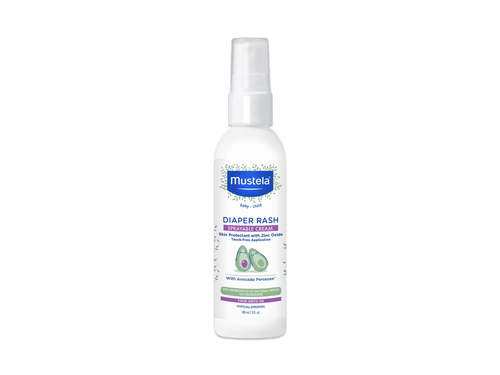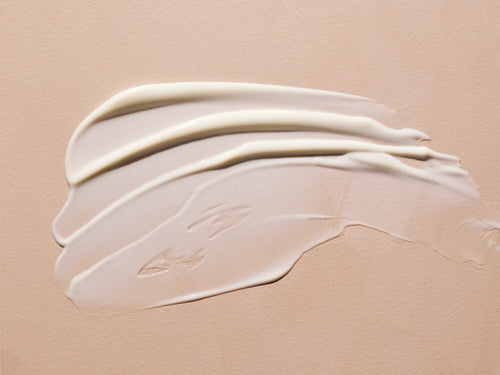Seems like just yesterday you found out you were pregnant, and now here you are holding your little bundle of joy and looking forward to all the changes and milestones you’ll get to experience as they grow.
It’s an exciting time, for sure! But, it’s also a bit nerve-wracking because your baby will grow quickly and what worked for them one month may not work for them the next month.
Mustela is here to help.
We’ve created this guide for caring for your baby month by month so you don’t have to worry about what changes are coming and can focus on keeping your little one happy and healthy as they grow.
Table Of Contents
- Newborn
- 1 Month Old
- 2 Months Old
- 3 Months Old
- 4 Months Old
- 5 Months Old
- 6 Months Old
- 7 Months Old
- 8 Months Old
- 9 Months Old
- 10 Months Old
- 11 Months Old
- 12 Months Old
Caring For Your Baby Month By Month

Newborn
The first few weeks of your baby’s life are pretty simple (for them, anyway). The bulk of their activity revolves around eating, sleeping, and making dirty diapers.
Your baby will need to be fed every two to three hours, but don’t worry about feeding them too much: They’ll stop when they’ve had enough.
They’ll also need to sleep a lot — between 15 and 18 hours per day — so be prepared to hold them while they sleep or put them down in a crib.
When they are awake, follow these tips to stimulate their mental and physical development:
- Hold them as much as possible
- Give them plenty of tummy time
- Speak, read, and sing to them whenever you can
For more information on caring for your newborn baby, check out these articles from the Mustela blog:
- Newborn Feeding Schedule: How Often To Feed Your Baby
- Newborn Sleep: The Complete Guide For Parents
- Skin-To-Skin Contact With Newborns | Everything A New Parent Needs To Know
- How To Bathe A Newborn: 10 Simple Steps
- Newborn Baby Essentials: The Ultimate First Year Shopping List
1 Month Old
By the time your baby has reached the one-month mark, they’ve already changed a lot. It may not seem like it, but it’s true!
They’ve likely gained a bit of weight. They can now see objects clearly when they are 12 to 14 inches away from their face (which is why holding them is so beneficial). And they can recognize the smell of your breastmilk and the sound of your voice.
They’ll continue with many of the same habits from the newborn stage — feeding and sleeping are the big two — so there may not be much to change there at this point.
For more information on caring for your one-month-old baby, take a few minutes to read these articles from the Mustela blog:
2 Months Old
At two months old, your baby’s senses continue to develop and you’ll likely notice that they’re getting stronger and developing new skills, including:
- Smiling
- Kicking
- Clasping object
- Using their arms to lift their head and shoulders during tummy time
Feeding pretty much remains the same — every two to three hours — but their sleep schedule may change slightly.
You can encourage longer sleep at night by trying not to let them sleep more than three consecutive hours during the day.
For more information on caring for your two-month-old baby, check out this article from the Mustela blog: Caring For Your 2 Month Old Baby.
3 Months Old
By three months old, your baby will likely have the ability to lift and control their head, reach for objects in front of them, grasp those objects, and move them around (especially toward their mouth!).
At this point, your baby may be eating six to eight times a day and you might be wondering about starting solid foods. But hold off on that. The American Association of Pediatrics recommends breastfeeding or bottle-feeding exclusively for the first six months.
Your baby may also experience a sudden change in their sleeping habits at 3 months old. This is completely normal, but it may take some time for your little one’s sleep schedule to return to normal.
For more information on caring for your 3 month old, check out these articles from the Mustela blog:
- Caring For Your 3 Month Old Baby
- 3 Month Old Feeding Schedule: When To Feed Your Baby
- 3-Month Sleep Regression: What It Is And How To Deal With It
4 Months Old

By four months old, your baby is hitting some incredible milestones! Their senses are developing rapidly, and you’ll be surprised at how quickly they’ll develop new motor and language skills.
In addition to lots of food and sleep, give your little one plenty of playtime and mental and physical stimulation to help them grow big and strong. This is also a good time to try teaching your baby to put themselves to sleep with a bit of sleep training.
Want more tips? Take a few minutes to read this article from the Mustela blog: Caring For Your 4 Month Old Baby.
5 Months Old
After 20 weeks of growth, your baby will likely be able to stay in a seated position when their back is supported and even roll from the back onto their tummy (or vice versa).
Your little one won’t need to eat as often, but they’ll still need to be fed every three to four hours.
Their sleep habits will also change from the previous months, and they may go for stretches of eight to 10 hours at night! They will still need to take short naps (up to 90 minutes) during the day, but that will leave you with plenty of time to play with them and help them build their skills.
For more on what to expect when your baby turns 5 months old, check out this article from the Mustela blog: Caring For Your 5 Month Old Baby.
6 Months Old
After six months of growth, you may notice your baby sitting by themself without support, kicking and pushing their body around with their legs, and standing up while leaning or holding onto something firm.
At this point, they’re finally ready to start eating solid foods, but breast milk or formula should still be the major source of nutrition in their diet.
It’s also about time for another sleep regression — they come about every three months — so prepare yourself for changes in their sleep habits.
To help you navigate through the six month stage, we’ve put together these articles:
- Caring For Your 6 Month Old Baby
- 6 Month Old Feeding Schedule: When To Feed Your Baby
- 6-Month Sleep Regression: What It Is And How To Deal With It
7 Months Old
At seven months, what started with kicking and pushing their body across the floor now changes into creeping, scooting, rolling, and maybe even crawling! Encourage these skills by providing plenty of toys that support your baby’s weight so they can move as much as possible.
Continue to introduce new solid foods, but keep in mind that you may still have to nurse or bottle feed four to six times per day.
And, after they get through the six-month sleep regression, some babies will start taking fewer naps and sleeping through the night (sometimes as much as 11 hours straight!).
For more detailed information on how to care for your seven-month-old baby, read this article from the Mustela blog: Caring For Your 7 Month Old Baby.
8 Months Old

Right around the eight-month mark, your baby’s temperament may change dramatically as they start to develop the concept of object permanence (the idea that objects continue to exist even when they can’t see them).
This can be a scary time for your little one, and they may exhibit separation anxiety. Reassure your child with plenty of hugs and kisses, remind them you’re coming back when you have to leave, and avoid long absences whenever possible.
For more ways to help your little one through this stressful time, check out this article from the Mustela blog: Caring For Your 8 Month Old Baby: the 8-Month Crisis.
9 Months Old
At nine months, your baby is well on their way to “big girl” or “big boy” status! They’ll start to recognize simple questions like, “Where’s the cat?” and you may even get simple words — like mama, dada, hi, and bye — in return.
Your nine-month-old may also start experimenting with standing instead of crawling as they get stronger and their balance improves.
Unfortunately, with these dramatic changes likely comes another sleep regression. Prepare yourself for the inevitable sleepless nights, and try some of the strategies you learned during the three- and six-month regressions to make things easier.
To learn more about your baby’s development at this stage and how you can help them continue to grow, read these articles from the Mustela blog:
- Caring For Your 9 Month Old Baby
- 9 Month Old Feeding Schedule: When To Feed Your Baby
- 9-Month Sleep Regression: What It Is And How To Deal With It
10 Months Old
As your baby grows closer and closer to the one year mark, you’ll need to be more concerned about mobility and safety within their environment.
Take time to baby proof your home with some or all of the following suggestions:
- Lower your baby’s crib mattress
- Keep the crib out of reach of cords, blinds, and curtains
- Raise curtains and blinds
- Cover all electrical outlets
- Install safety locks on drawers and cabinets
- Put a childproof lock on the toilet
And, for more insight into how to care for your baby as they pass the 10-month mark, take a look at this article from our blog: Caring For Your 10 Month Old Baby.
11 Months Old
By 11 months, your child will be consuming a wide variety of solid foods, but experts still recommend waiting to wean your baby completely until at least the 12-month mark.
They’ll likely be sleeping soundly through the night now and may only take two naps per day. Unfortunately, there’s possibly another sleep regression coming, so prepare yourself.
For more information about your child at this age, read this article: Caring for Your 11 Month Old Baby.
12 Months Old
Has it been twelve months already? Oh, how time flies!
Milestones of the one-year mark include:
- Taking a few steps on their own
- Making efforts to communicate
- Weaning
- Starting to become a true individual
Check out these articles from the Mustela blog for help navigating these exciting times:
- Caring For Your 1 Year Old Baby
- 12 Month Old Feeding Schedule: When To Feed Your Baby
- The Complete Guide To Understanding And Surviving Sleep Regression
The Key To Caring For Your Baby: Patience & Love

The key to caring for your baby month after month is easy: Be patient and give them lots of love!
With those two qualities, you’ll be able to handle all the challenges that come with nurturing a baby from birth to 12 months old (and beyond).
Follow the tips in this article, talk to your doctor when necessary, and be sure to take care of yourself so you can give all your love and attention to your growing child.
To learn more about the essentials for caring for baby month by month, head to the Mustela blog, click or tap on the magnifying glass in the upper right corner, and search our long list of resources for parents.












